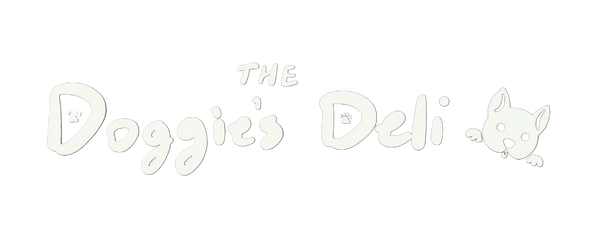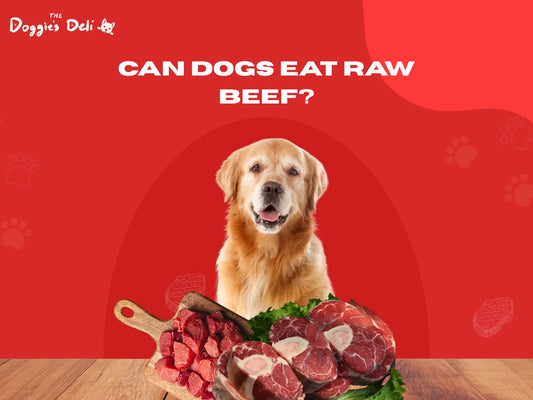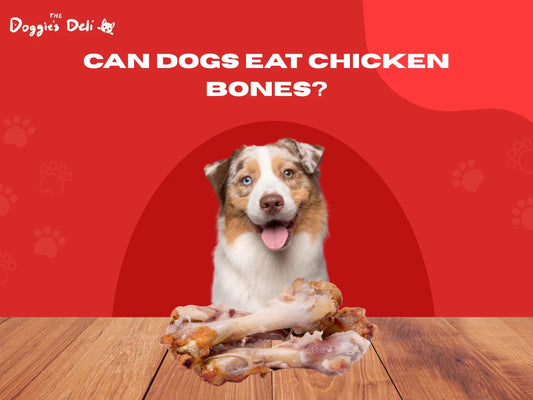
Can Dogs Eat Chicken?
Share
Yes, dogs can eat chicken, as it is a safe and nutritious protein that supports muscle growth, energy, and overall health when properly prepared. Rich in amino acids, vitamins, and minerals, chicken is a nutritious addition to your dog’s diet. Due to its exceptional palatability, chicken is ideal for dogs with sensitive stomachs.
To ensure safety, chicken should always be thoroughly cooked. Boiled, grilled, or baked chicken are safe options, while raw or fried chicken can pose risks. Chicken bones, in particular, are dangerous as they can splinter and cause choking or internal injuries. Some dogs may also develop allergies to chicken, so it is important to monitor for any signs of digestive upset or skin irritation.
Chicken should be part of a balanced diet and served in moderation, as it should not be the sole protein source for your dog. It is important to avoid feeding fried chicken, chicken bones, or heavily seasoned chicken, as these can pose health risks. By offering chicken in safe forms and as an occasional treat, you can ensure your dog benefits from its nutritional value without compromising their health.
Is Chicken Safe and Beneficial for Dogs?
Yes, chicken is safe and beneficial for dogs when properly cooked and served without harmful seasonings like garlic, onion, scallions, nutmeg, and mustard. Its high digestibility and low-fat content make it an excellent, nutritious protein choice that supports muscle growth, boosts energy, and provides essential vitamins like B6 and niacin, which promote healthy skin and coat.
To ensure safety, dog owners should always cook chicken thoroughly and avoid feeding raw or fried chicken. You should also avoid serving chicken bones and heavily seasoned chicken to dogs, as they can cause choking or digestive issues. In moderation, chicken can be a great addition to a balanced diet, but it should never be the sole protein source.
Nutritional Benefits of Chicken for Dogs
Chicken is a highly nutritious protein that provides essential amino acids to support muscle growth, energy, and overall health in dogs. It is rich in vitamins like B6 and niacin, which contribute to healthy skin and coat, as well as boost metabolism. The minerals in chicken, such as phosphorus and selenium, also play a key role in maintaining strong bones and supporting the immune system. Additionally, chicken is easy to digest, making it an excellent choice for dogs with sensitive stomachs.

Below are the key nutritional benefits of chicken for dogs:
-
High in protein: Supports muscle growth, repair, and overall strength.
-
B Vitamin (B6, B3, B12): Enhances brain function, immune response, red blood cell formation, and energy metabolism
-
Amino Acid: Promotes muscle development and contributes to healthy skin and coat.
-
Omega-6 fatty acids: Sustain healthy skin and promote a shiny, vibrant coat.
-
Niacin: Converts food to energy and promotes cellular health.
-
Phosphorus: Strengthens bones and teeth while supporting skeletal development.
-
Selenium: Boosts thyroid function and improves skin and coat condition.
-
Low-fat: Helps maintain an ideal weight and supports digestive health.
Is Chicken Safe for Dogs to Eat Daily?
Yes, dogs can eat chicken daily, but it should be served in moderation and as part of a balanced diet. While chicken provides a high-quality protein source, feeding it exclusively every day may lead to nutritional imbalances. Dogs need a variety of proteins, fats, and carbohydrates to ensure they receive all the essential nutrients for overall health. Over-reliance on chicken can cause deficiencies in other important nutrients, such as fiber and healthy fats.
When feeding chicken daily, it should be prepared without seasoning, bones, or skin, and served alongside other ingredients like vegetables or grains. The portion size should be based on your dog’s size, age, and activity level to avoid overfeeding and prevent weight gain. For example, a large dog may require a larger portion, while smaller breeds need less. As long as chicken is part of a varied diet and not the only protein source, it can be a healthy and nutritious daily option for your dog.
Chicken vs. Other Proteins (Beef, Turkey, Fish, etc.)
Chicken is often a top choice for dogs due to its lean, easily digestible protein content, but how does it compare to other protein sources like beef, turkey, and fish? Each protein offers unique benefits, and rotating between different types can help ensure your dog gets a variety of nutrients. While chicken is excellent for muscle growth and overall health, beef is richer in iron, turkey is a lean alternative, and fish provides valuable omega-3 fatty acids that promote healthy skin and coat.
Below is a comparison of chicken with other proteins:
|
Protein Source |
Benefits |
Considerations |
|
Chicken |
High in protein, easy to digest, rich in B vitamins and niacin |
Lean option, but should be served in moderation to avoid over-reliance |
|
Beef |
Rich in iron, zinc, vitamin B, and other minerals |
Higher in fat, which may not be suitable for dogs with weight concerns |
|
Turkey |
Lean protein, good for heart health, lower fat compared to beef |
Can be a good alternative for dogs sensitive to other meats |
|
Fish |
High in omega-3 fatty acids, supports joint health, promotes skin and coat health |
Can cause allergies in some dogs, and should be given without bones or seasoning |
Can Dogs Eat Raw Chicken?
Dogs can eat raw chicken, but it carries significant risks, including bacterial infections like Salmonella and E. coli. Raw chicken is more likely to be contaminated, which can cause foodborne illnesses in both dogs and humans. If you choose to feed raw chicken, ensure it comes from a reputable supplier and is stored properly to reduce contamination risks.
While feeding raw chicken to canines, strict food safety measures, such as proper handling, washing hands after touching raw meat, and storing it at the correct temperature, should be followed. It is also important to monitor your dog for any adverse reactions like digestive upset and consult with a vet to ensure a balanced diet. Some dogs may struggle to digest raw chicken, so it should be introduced gradually.
Both the American Veterinary Medical Association (AVMA) and the FDA recommend against feeding raw meat to dogs due to the health risks involved.
Can Dogs Eat Raw Chicken Bones?
Dogs can eat raw chicken bones, but they still pose certain risks, especially if not properly handled. While raw chicken bones are softer than cooked ones and less likely to splinter, they can still cause choking, digestive blockages, or even internal injuries if they’re too large or improperly chewed. Additionally, raw chicken carries the risk of bacterial contamination like Salmonella, which can lead to severe health issues in dogs.
If you decide to feed your dog raw chicken bones, ensure they are appropriately sized for your dog’s breed and size, and always supervise them while eating. It is crucial to observe your dog for any signs of choking or digestive discomfort. If safety is a concern, safer alternatives, such as rubber chew toys or sterilized bones, are better options to avoid these risks.
Can Dogs Get Salmonella from Raw Chicken?
Yes, dogs can contract Salmonella from raw chicken, as it often carries harmful bacteria that can lead to illness. Infected dogs may experience symptoms such as vomiting, diarrhea, lethargy, and loss of appetite, with puppies and older dogs being more vulnerable to severe complications. In severe cases, Salmonella poisoning can cause dehydration and sepsis.
To minimize the risk, always handle raw chicken with care, store it properly, and buy it from a reputable supplier. However, many veterinarians recommend avoiding raw chicken altogether due to the health risks it poses to both your dog and your household.
Should Puppies Eat Raw Chicken?
Puppies should not eat raw chicken due to their developing immune systems and higher susceptibility to bacterial infections like Salmonella. Their digestive systems are still maturing, making them more vulnerable to foodborne illnesses that can result from consuming raw meat.
For puppies, it is essential to provide a nutritionally balanced diet with properly cooked food to support healthy growth and development. Feeding raw chicken to puppies can also disrupt their digestive systems and lead to issues such as vomiting or diarrhea. To ensure your puppy receives all the necessary nutrients, consult with a veterinarian before introducing any new foods into their diet.
Can Dogs Eat Cooked Chicken?
Yes, cooked chicken is safe for dogs and provides a nutritious source of protein when prepared properly. Cooking eliminates harmful bacteria like Salmonella, making it a safer option than raw chicken. It is also rich in vitamins and minerals that support your dog’s muscle growth, energy, and overall health.
To ensure safety, cook chicken thoroughly and remove bones, skin, and seasoning. Boiling, grilling, or baking without added oils or spices is the best approach. Avoid using toxic ingredients like garlic, onions, or salt. Also, dog owners should serve cooked chicken in moderation as part of a balanced diet.
How to Properly Cook Chicken for Dogs?
To cook chicken for dogs, remove the skin, bones, and seasoning. Boil, grill, or roast the chicken without adding oils, spices, or seasoning. Boil the chicken for 15-20 minutes until fully cooked, or grill/roast it until the meat reaches an internal temperature of 165°F. Once cooled, cut the chicken into small, bite-sized pieces to prevent choking. Serve it as part of a balanced meal, alongside dog-safe ingredients like vegetables or rice.
Boiled Chicken for Dogs (Step-by-Step Guide)
Boiling chicken is one of the easiest and safest methods to prepare it for dogs. It removes any harmful bacteria while keeping the chicken lean and easy to digest. By following a simple process, you can ensure your dog gets a healthy, protein-packed meal.
Steps to Boil Chicken for Dogs:
1. Remove any skin and bones from the chicken to prevent choking hazards.
2. Submerge the chicken in a pot of water, ensuring it's fully covered.
3. Bring the water to a boil, then reduce the heat and simmer for 15-20 minutes until the chicken is fully cooked.
4. Allow the chicken to cool completely before serving it to your dog.
5. Cut the chicken into small, bite-sized pieces to prevent choking.
6. Serve the boiled chicken without any seasoning or additives. You can mix it with other dog-safe foods like rice or vegetables.
Grilled Chicken for Dogs
Grilling chicken is a healthy and flavorful way to prepare it for your dog. It enhances the natural taste without the need for oils or harmful seasonings, making it a safe and nutritious choice. Grilled chicken is rich in protein and essential nutrients, but it’s important to prepare it properly to ensure your dog’s safety.
Steps to Grill Chicken for Dogs:
1. First, take off the skin and bones from the chicken.
2. Heat the grill to medium heat for even cooking.
3. Sear each side for 4-6 minutes, then continue grilling for 15-20 minutes, until the internal temperature reaches 165°F.
4. Cool the chicken and slice it into bite-sized pieces to avoid choking.
Baking or Roasting Chicken for Dogs
Baking or roasting chicken is a great way to provide your dog with a healthy, nutrient-packed meal. These methods preserve the chicken’s natural flavors and nutritional value without the need for unhealthy oils or seasonings, making it a safe and delicious choice for your dog.
Steps to Bake or Roast Chicken for Dogs:
1. Always remove the skin and bones to eliminate choking hazards.
2. Set the oven to 425°F (220°C) for even cooking.
3. Bake for 25-30 minutes, until juices run clear and meat is firm.
4. Let cool, remove any residual fat, and serve into bite-sized pieces..
Can Dogs Eat Seasoned Chicken? (Spices to Avoid)
Dogs should not eat seasoned chicken, as many common spices and seasonings are harmful to them. Ingredients like garlic, onions, and excessive salt can be toxic to dogs, leading to symptoms like vomiting, diarrhea, and even more severe health issues. To ensure your dog stays safe, always serve plain, unseasoned chicken.
Spices and Ingredients to Avoid in Chicken:
-
Garlic, onion, and chives: Damage red blood cells, leading to anemia.
-
Chili powder: Causes mouth and digestive system irritation.
-
Nutmeg: Can cause severe stomach upset and affect nervous system function.
-
Cocoa powder: Leads to vomiting and diarrhea.
-
Cayenne pepper: Irritates the mouth and throat.
-
Mustard seed/powder: Toxic and causes digestive upset.
-
Hops: Toxic to dogs and can cause serious health issues.
-
Bay leaves: Toxic, causing upset stomach.
-
Paprika: Causes stomach discomfort.
-
Aloe vera: Toxic, leading to digestive issues.
-
Pennyroyal: Toxic, can cause vomiting, diarrhea, weakness, and liver damage.
Safe Spices and Herbs for Dogs:
-
Parsley: Freshens breath and provides antioxidants.
-
Turmeric: Supports joint health and reduces inflammation.
-
Basil: Anti-inflammatory, antioxidant, and contains vitamins A, B complex, C, and E.
-
Ginger: Aids digestion and reduces nausea.
-
Rosemary: Promotes heart health, eases digestion, and is rich in iron.
-
Sage: Supports the immune system, soothes digestion, and fights seasonal allergies.
-
Cinnamon: Antibacterial and regulates blood sugar.
Is Chicken Skin Safe for Dogs?
Chicken skin is not ideal for dogs, as it is high in fat and calories. While a small amount of chicken skin on rare occasions may not cause harm, feeding it regularly can lead to digestive issues, obesity, and pancreatitis due to the excess fat. It may also cause discomfort in dogs with sensitive stomachs.
If you choose to give your dog chicken skin, it should be in moderation and only as an occasional treat. The best option is to remove the skin before serving the chicken to ensure your dog enjoys the benefits of lean protein without the risks associated with high-fat content. For a healthier meal, consider serving chicken without the skin or offering lean cuts like chicken breast.
Can Dogs Eat Fried Chicken?
Dogs should not eat fried chicken, as it is high in unhealthy fats and oils that can lead to digestive issues, obesity, and pancreatitis. Fried foods, including fried chicken, are often cooked with seasonings, batter, and oils that are harmful to dogs. Ingredients like garlic, onion powder, and excessive salt can also be toxic to dogs, causing symptoms like vomiting, diarrhea, and lethargy.
If you want to treat your dog to chicken, it is best to serve it in a healthy form, such as boiled, grilled, or baked chicken, without any seasoning or added fats. Fried chicken should be avoided entirely to keep your dog safe and healthy.
Can Dogs Eat Chicken Bones?
Dogs should never eat chicken bones, whether cooked or raw, as they can splinter and cause serious injuries such as choking, perforated intestines, or damage to the digestive tract. Cooked bones are dangerous because they are brittle and break easily into sharp pieces. Even raw bones can present risks, including choking or blockages, if they are not the right size or shape for your dog.
For safe chewing, offer your dog alternatives like durable chew toys or specially designed bones. Always supervise your dog while they are chewing to prevent any potential hazards.
Are Raw Chicken Bones Safe for Dogs?
Raw chicken bones are softer than cooked ones, making them less likely to splinter. However, they still carry risks, such as choking, digestive blockages, and injury to the gastrointestinal tract, especially if they are too large or if your dog swallows them whole. Additionally, raw chicken bones can contain harmful bacteria like Salmonella, which can cause foodborne illnesses for both dogs and humans.
If you decide to feed raw chicken bones to your dogs, it is important to take the following precautions:
-
Always watch your dog while they are chewing on raw chicken bones.
-
Make sure the bones are the right size for your dog’s breed and size to avoid choking.
-
Handle raw bones carefully to prevent bacterial contamination and wash your hands thoroughly.
-
Many veterinarians recommend safer chew toys or bones designed specifically for dogs.
Cooked Chicken Bones vs. Raw Chicken Bones
Cooked bones are particularly dangerous due to their tendency to splinter, while raw bones are softer but can still cause choking or digestive blockages. Both types of bones should generally be avoided to keep your dog safe.
Comparison of Cooked and Raw Chicken Bones:
|
Bone Type |
Risks |
Safety Measures |
|
Cooked Bones |
Splinter easily, causing choking or internal injury |
Avoid completely; no safe form for dogs |
|
Raw Bones |
Can still cause choking, digestive blockages, and bacterial contamination (e.g., Salmonella) |
Supervise chewing, ensure appropriate size, and handle with care |
What to Do if Your Dog Eats a Chicken Bone?
If your dog eats a chicken bone, it is crucial to act quickly to prevent potential choking, internal injury, or digestive problems. While some dogs may pass the bone without issue, the risk of a blockage, puncture, or other health complications makes immediate action important.
Steps to Take if Your Dog Eats a Chicken Bone:
1. Watch for gagging, choking, excessive drooling, or difficulty breathing.
2. Keep an eye out for vomiting, diarrhea, or lethargy over the next 24-48 hours.
3. Avoid putting your hands in your dog’s mouth, as this could push the bone further down.
4. If your dog shows signs of pain, choking, or discomfort, take them to the vet right away.
Even if your dog seems fine, it is always a good idea to contact your veterinarian for advice. In some cases, the bone may cause internal injuries that are not immediately apparent.
Common Myths About Chicken Bones and Dogs
There are several myths about dogs eating chicken bones, but it's important to know the facts to keep your dog safe. Some believe that dogs can safely chew on chicken bones, but in reality, they can cause severe harm. Understanding these myths can help you avoid risky situations and make safer choices for your dog’s diet.
Common Myths About Chicken Bones:
-
Dogs can chew chicken bones without harm: This is false, as cooked bones splinter easily, and raw bones can still cause choking or digestive blockages.
-
Bones are good for dogs' teeth: While chewing on bones may help clean teeth, the risk of injury from chicken bones far outweighs any dental benefits.
-
If a dog swallows a chicken bone, they will pass naturally: While this may happen in some cases, swallowing a bone can lead to severe complications like internal injury or infection.
-
Raw bones are always safer than cooked bones: Raw bones can still pose risks, such as choking or digestive issues, and should be given with caution.
-
Dogs with strong jaws can handle any bone: Even strong-jawed dogs are at risk, as bones can break, splinter, and cause serious injuries, regardless of jaw strength.
-
Small chicken bones are safer for dogs: Small bones can still cause choking or internal damage, and even tiny splinters can result in severe injuries.
To keep your dog safe, avoid feeding them chicken bones altogether and provide safer chew toys or dental treats instead.
What Types of Chicken-Based Products Can Dogs Eat?
Dogs can safely eat chicken-based products like chicken breast, chicken gizzards, chicken broth, chicken heart, and chicken liver. These products can provide high-quality protein and essential nutrients, making them great choices for your dog’s diet.
You can also consider chicken treats for dogs as a healthy snack option. Look for treats made from high-quality chicken, such as dehydrated chicken treats or chicken hearts. Always ensure they are free from harmful additives like garlic, onions, or excess salt, and feed them in moderation as part of a balanced diet.
Can Dogs Eat Chicken Broth?
Yes, dogs can eat chicken broth only if it is simple and free from harmful ingredients like garlic, onions, or too much salt. When prepared correctly, chicken broth can be a good way to hydrate your dog and add some extra taste to their meals. Be sure to pick a broth that is low in sodium and without any added spices or seasoning to prevent potential digestive issues.
Is Chicken Broth Safe for Dogs?
Chicken broth is generally safe for dogs, as long as it is made without harmful ingredients like garlic, onions, or excessive salt. It can provide hydration and flavor, which some dogs enjoy. Store-bought options, however, may contain high amounts of sodium and preservatives, making homemade or low-sodium broths a better choice. Always serve in small amounts to avoid upsetting your dog's stomach.
Can Dogs Eat Chicken Feet?
Dogs can safely eat chicken feet, which are packed with collagen that supports joint health, promotes a shiny coat, and contributes to better dental health. When properly cleaned and cooked, chicken feet can be a nutritious and enjoyable treat for your dog. However, raw chicken feet can carry harmful bacteria, so it is important to serve them dehydrated or fully cooked to ensure your dog’s safety.
Can Dogs Eat Chicken Nuggets?
No, dogs should not eat chicken nuggets, as they are typically fried and contain unhealthy fats, excess salt, and harmful seasonings like garlic or onion powder, which are toxic to dogs. These ingredients can cause digestive upset, pancreatitis, and even poisoning in severe cases. Instead, offer your dog plain, cooked chicken without any seasoning or additives to ensure their safety and health.
Can Dogs Eat Canned Chicken?
Yes, dogs can eat canned chicken, but it must be plain and free from additives like salt, seasoning, or preservatives. Many canned chicken products contain high sodium levels, which can lead to dehydration, kidney problems, and high blood pressure in dogs. Always check the label to ensure the chicken is low-sodium or no-salt-added, and serve it in moderation as part of a balanced diet.
Can Dogs Eat Chicken Breast?
Yes, dogs can eat chicken breast as it is a healthy and safe option, providing lean protein that supports muscle growth and overall health. Skinless, boneless, and cooked chicken breast is easy to digest and low in fat, making it ideal for dogs, especially those with sensitivities. Make sure to serve it plain, without any seasoning, oils, or additives that could be harmful.
Can Dogs Eat Chicken Neck?
Dogs can eat chicken necks, which are a good source of collagen, benefiting joint health, skin, coat, and dental health. When properly cooked or dehydrated, chicken necks make a nutritious chew. However, dog owners should avoid feeding raw chicken necks due to the risk of harmful bacteria. So, you should cook or dehydrate them before feeding chicken necks to dogs.
Can Dogs Eat Chicken Liver?
Chicken liver is safe for dogs and provides essential nutrients like iron, vitamin A, and B vitamins, supporting energy, immunity, and vision. However, it should be served in moderation due to its high vitamin A content. Feeding too much chicken liver to dogs can lead to toxicity, causing symptoms like bone deformities, joint pain, and nausea. Always cook the liver thoroughly and avoid harmful ingredients like garlic or onions.
Can Dogs Eat Chicken Heart?
Dogs can eat chicken hearts, which offer high-quality protein, taurine, and essential vitamins that support heart health and muscle function. When served in moderation, chicken hearts are a nutritious addition to your dog’s diet. Be sure to cook them thoroughly and avoid adding any seasonings or harmful ingredients.
Can Dogs Eat Chicken Gizzards?
Yes, dogs can safely eat chicken gizzards. These chicken organs provide protein, vitamins, and minerals that support muscle growth and overall health. Low in fat and easy to digest, chicken gizzards make a healthy snack for dogs. Be sure to cook them thoroughly without seasoning or additives, as raw gizzards can carry harmful bacteria.
Is Chicken Meal in Dog Food a Good Choice?
Yes, chicken meal is a high-quality protein source in dog food, providing concentrated protein that supports muscle growth and overall health. Chicken meal is made by cooking chicken to remove moisture, resulting in a protein density that’s about 300% higher than fresh chicken. It is rich in essential amino acids, like lysine and methionine, which are crucial for tissue repair and immune function. When sourced properly, chicken meal can be a highly beneficial ingredient in your dog’s diet.
The following table compares chicken meal and fresh chicken in different aspects.
|
Factor |
Chicken Meal |
Fresh Chicken |
|
Water content |
10% |
70% |
|
Protein |
65% |
18% |
|
Fat |
12% |
5% |
|
Nutrient Concentration |
Higher levels of amino acids, minerals |
Fewer nutrients per gram due to moisture |
|
Digestibility |
Easily digested and processed for nutrient absorption. |
Naturally digestible but with lower nutrient density per gram. |
|
Shelf Stability |
Long shelf life, ideal for dry kibble |
Requires refrigeration or cooking |
|
Cost Efficiency |
More affordable per gram of protein |
More expensive per nutrient delivered |
Can Dogs Eat Rotisserie Chicken?
No, dogs should not eat rotisserie chicken as it often contains seasoning, spices, and excess fat that can be harmful to them. While the meat itself provides a good source of protein, the skin and seasoning, such as garlic, onion, and salt, can lead to digestive issues or toxicity. Always remove the skin, bones, and any harmful seasonings before offering rotisserie chicken to your dog, and serve it in moderation.
How Much Chicken Should You Feed Your Dog?
The amount of chicken you feed your dog should be about 10-15% of their daily caloric intake, ensuring they receive the nutritional benefits without overfeeding. To determine the right portion, consider factors like your dog’s size, activity level, and overall health.
Factors to Consider When Feeding Chicken to Your Dog:
-
Size and weight: Larger dogs need more food than smaller dogs.
-
Activity level: Active dogs require more protein to maintain energy.
-
Health conditions: Dogs with health issues may need adjusted portions.
|
Dog Size |
Chicken Portion (Cooked) |
Examples of Breeds |
Feeding Frequency |
|
Extra-small (2–20 lbs) |
About 1 tablespoon |
Yorkies, Chihuahuas, Pomeranians, Pugs |
As an occasional treat, 2–3 times a week |
|
Small (21–30 lbs) |
2 tablespoons |
Basenjis, Beagles, Miniature American Shepherds |
As a treat or small part of a balanced meal with grains and vegetables |
|
Medium (31–50 lbs) |
Up to 1/4 cup |
Basset Hounds, Border Collies, Australian Cattle Dogs |
As part of a balanced meal, a few times weekly |
|
Large (51–90 lbs) |
About 1/3 cup |
Pit Bulls, German Shepherds, Labrador Retrievers, Australian Shepherds |
Can be used in meals regularly (not daily) |
|
Extra-large (91+ lbs) |
About 1/2 cup |
Newfoundlands, Bernese Mountain Dogs, Saint Bernards, Great Pyrenees |
Regular meal addition, 2–3 times per week |
Should Chicken Be a Regular Meal or an Occasional Treat for Dogs?
Chicken should be fed to dogs as an occasional treat rather than a regular meal. While chicken is an excellent source of lean protein, it lacks the essential fats, vitamins, and carbohydrates that are needed for a complete and balanced diet. Feeding your dog only chicken can lead to nutritional imbalances, as it does not cover all the nutritional needs required for their health and well-being.
To ensure a well-rounded diet, chicken should be incorporated with other protein sources like fish, beef, or lamb, as well as a variety of vegetables and grains. This helps provide the complete range of nutrients your dog needs to stay healthy and energetic. By offering chicken in moderation and as part of a varied diet, you can give your dog a delicious treat that supports their overall nutrition.
How Much Chicken and Rice Should You Feed a Sick Dog?
You should feed a sick dog a 1:2 ratio of chicken and rice (one part chicken to two parts rice) to help soothe their stomach and support digestion. This bland diet is easy on their digestive system and provides essential nutrients during recovery. The amount of chicken and rice you feed will depend on your dog’s weight, and it’s important to adjust portions based on their appetite and condition.
Below is a guide to help you determine the appropriate portion size based on your dog’s weight:
|
Dog Weight |
Chicken (cups/day) |
Rice (cups/day) |
|
10 lbs or less |
1/3 cup |
2/3 cup |
|
10-20 lbs |
1/2 cups |
1 cup |
|
20-30 lbs |
3/4 cup |
1 1/2 cups |
|
30-40 lbs |
1 cup |
2 cups |
|
40-60 lbs |
1 1/4 cups |
2 1/2 cups |
|
60-80 lbs |
1 3/4 cups |
3 1/2 cups |
|
80-100 lbs |
2 1/4 cups |
4 1/2 cups |
Always monitor your dog’s condition and adjust the portions as necessary. If symptoms persist, consult with your veterinarian for further guidance.
Can Dogs Be Allergic to Chicken?
Yes, dogs can be allergic to chicken, though it is relatively uncommon. Food allergies in dogs typically manifest as gastrointestinal upset, skin irritations, or itching. In the case of a chicken allergy, symptoms may include vomiting, diarrhea, excessive itching, ear infections, or inflammation around the face and paws.
If you suspect your dog has a chicken allergy, immediately eliminate chicken from their diet and consult with your veterinarian. Your vet may recommend an elimination diet to identify the specific cause and help find an appropriate protein source for your dog.
What Are the Symptoms of Chicken Allergies in Dogs?
The symptoms of chicken allergies in dogs can vary, but they typically affect the digestive system or skin. If your dog is allergic to chicken, you may notice changes in their behavior or physical condition shortly after eating it.
Common Symptoms of Chicken Allergies in Dogs:
-
Vomiting: Often occurs shortly after eating chicken.
-
Diarrhea: Can be frequent and watery.
-
Itchy skin: Especially around the face, ears, or paws.
-
Ear infections: Often recurrent due to inflammation.
-
Red or inflamed skin: Caused by itching or licking.
-
Digestive discomfort: Including bloating or gas.
If your dog shows any of these signs after consuming chicken, it is important to consult with your veterinarian to confirm the allergy and adjust their diet accordingly.
How Can You Identify and Treat a Chicken Allergy in Dogs?
Identifying and treating a chicken allergy in dogs involves a combination of observation, dietary changes, and professional guidance. If you suspect your dog has a chicken allergy, the first step is to eliminate chicken from their diet and monitor their symptoms. Your veterinarian can help confirm the allergy through an elimination diet or allergy testing, which will help pinpoint the specific trigger.
Steps to Identify and Treat a Chicken Allergy in Dogs:
1. Eliminate chicken from the diet: Remove all chicken-based foods and treats to see if symptoms improve.
2. Monitor symptoms: Track your dog’s behavior and symptoms to assess whether they improve without chicken.
3. Consult your veterinarian: Work with your vet to perform an elimination diet or allergy test for acan curate a diagnosis.
4. Introduce alternative proteins: Once confirmed, replace chicken with other protein sources like beef, turkey, or fish.
5. Manage symptoms: Your vet may recommend antihistamines or other treatments to alleviate symptoms if they persist.
What Are the Best Alternative Protein Sources for Dogs with Chicken Allergies?
If your dog has a chicken allergy, the best alternative protein sources include beef, turkey, lamb, fish, venison, and duck, which can provide the necessary nutrients without causing allergic reactions. These proteins are highly digestible and offer a balanced amino acid profile, ensuring your dog continues to receive the nutrition they need for overall health and vitality.
Top Alternative Protein Sources for Dogs with Chicken Allergies:
-
Beef: A highly digestible protein rich in essential nutrients like iron and zinc.
-
Turkey: A lean protein often well-tolerated by dogs with food sensitivities.
-
Lamb: A great alternative that’s less likely to cause allergic reactions.
-
Fish (Salmon, Trout, etc.): Rich in omega-3 fatty acids, which support skin health and reduce inflammation.
-
Venison: A novel protein ideal for dogs with multiple food sensitivities.
-
Duck: Provides a rich source of protein and is often well-tolerated by dogs with chicken allergies.
What Do Experts Say About Dogs Eating Chicken?
Experts generally agree that chicken is a safe and beneficial protein for dogs when prepared properly. It provides high-quality protein that supports muscle growth, energy levels, and overall health. However, they emphasize the importance of moderation and a balanced diet, as chicken should not be the sole food source. Raw chicken is discouraged due to the risk of bacterial contamination like Salmonella, so it is essential to cook chicken thoroughly and avoid seasoning or harmful additives. When served correctly, chicken can be a healthy and nutritious part of your dog’s diet.
Expert Insights on Feeding Chicken to Dogs:
-
Dr. Ian Billinghurst: Whole raw chicken with vegetables can improve immune function, energy, skin and coat health, and reduce body odor.
-
Pomianowski J.F. et al.: Poultry meat is easier to digest and has higher protein content than other meats, making it a great nutritional source for dogs.
-
Dr. Nerissa Hannink: Feeding raw chicken increases the risk of acute polyradiculoneuritis (APN) in dogs by more than 70 times.
-
Cornell Richard P. Riney Canine Health Center: For digestive health, unseasoned boiled chicken with rice is the best option for dogs recovering from diarrhea.
These expert recommendations highlight the importance of preparation methods and portion control when incorporating chicken into a dog’s diet.
Frequently Asked Questions
Can Dogs Eat Chicken Soup?
Yes, dogs can eat chicken soup, but it should be plain without any added seasonings like garlic, onions, or salt. These ingredients can be harmful to dogs, so always ensure the soup is free from any toxic additives. Homemade, low-sodium chicken broth with small pieces of chicken can be a good option, especially for dogs needing extra hydration or recovery.
What Seasonings Are Safe for Dogs?
The only seasonings that are safe for dogs in moderation are parsley, turmeric, basil, ginger, and rosemary. These spices can offer some health benefits, like aiding digestion or providing antioxidants, but all others, such as garlic, onion, and salt, should be avoided as they are toxic to dogs.
Can Dogs Live on Chicken Alone?
No, dogs cannot live on chicken alone as it lacks essential nutrients like fiber, omega-3s, and various vitamins. Dogs need a variety of proteins, vegetables, and carbohydrates to meet their nutritional needs and maintain good health.
Frequently Asked Questions
Can Dogs Eat Rotisserie Chicken?
No, dogs should not eat rotisserie chicken because of its added seasonings, oils, and high sodium content. These ingredients are harmful to dogs, causing digestive issues and toxicity. If you decide to feed your dog rotisserie chicken, ensure it is skinless, plain, and free from toxic additives.
Can Dogs Eat Chicken Gizzards and Hearts?
Yes, dogs can eat chicken gizzards and hearts. These organs are rich in protein, iron, and essential vitamins, which support muscle growth and energy. When cooked properly and served in the correct portions, they are safe and nutritious for dogs.
Can Dogs Eat Raw Chicken Liver?
Yes, dogs can eat raw chicken liver. This chicken organ, when cooked properly, offers a high level of protein, vitamins (A, B-complex), minerals (iron, copper), and essential fatty acids, which are beneficial for a dog's health. However, serving excessive live can lead to vitamin A toxicity, so feed in small amounts.
Can Dogs Eat Chicken Soup?
Yes, dogs can eat chicken soup without seasoning. Plain, homemade chicken soup is safe for dogs and can aid recovery during illness. It provides hydration, digestive support, and nutrients.
What Seasonings Are Safe for Dogs?
Parsley, turmeric, and ginger are safe seasonings for dogs. They support digestion and joint health. Avoid garlic, onion, salt, chili, and nutmeg, as they are toxic and harmful to the digestive system. Always feed unseasoned or lightly seasoned food.
Can Dogs Live on Chicken Alone?
No, dogs cannot live on chicken alone as it lacks essential nutrients like fiber, omega-3s, and various vitamins. A balanced diet with varied protein sources, vegetables, and grains is vital for long-term health and energy. Consult a veterinarian for proper dietary planning.










